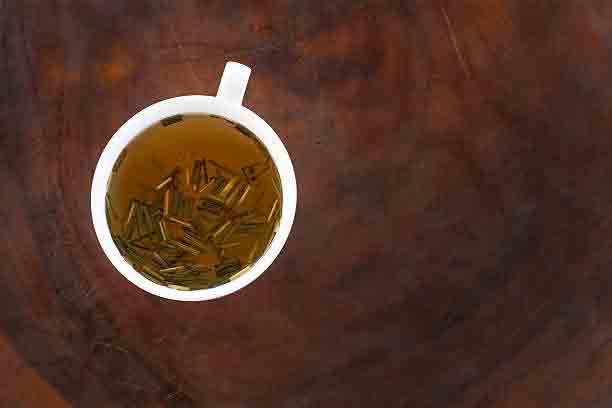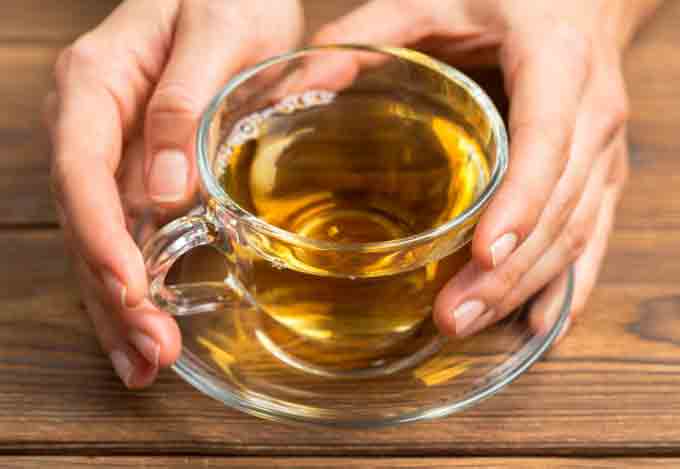Bloating can be a real pain in the digestive tract. Whether it’s from menstrual symptoms, overeating or food intolerances, it’s uncomfortable and can cause abdominal swelling.
Thankfully, there are easy ways to beat the bloat with natural remedies like these gut-friendly herbal teas. They’re the perfect pick me up to soothe your belly.
1. Peppermint Tea
Peppermint tea can soothe an upset stomach and reduce symptoms of irritable bowel syndrome, like abdominal pain and bloating. Its menthol content can relax the muscles in your digestive tract, helping ease cramping and improve digestion, while releasing excess gas.

It can also freshen your breath. In fact, it’s been used to fight indigestion since ancient times. It works by speeding up the movement of food from your stomach to continue on your digestive tract.
Herbal teas (or tisanes) are made from herbal leaves, spices or other plants steeped in hot water. They are caffeine-free and usually low in calories. They can also offer health benefits, like boosting your immune system or reducing your stress levels. Try our Organic Peppermint & Spearmint Tea or our refreshing Lemon Mint Tea.
2. Turmeric Tea
Aside from the fact that turmeric is one of the most powerful anti-inflammatory foods on the planet, it also helps relieve bloating by stimulating gallbladder function and helping your body break down fats. Turmeric has also been shown to help with hormonal imbalances and bloating associated with PMS by hindering estrogen signaling pathways.
The best part about this tea is that you can easily make it yourself at home with ingredients you probably already have in your pantry. It’s also an easy gift to make for a friend or family member.
If you don’t have any fresh ginger or turmeric root available, you can use a ground spice instead. You can also add healthy fats like coconut oil or ghee to your tea to increase the uptake of curcumin.
3. Chamomile Tea
You probably know chamomile for its snooze-inducing properties, but this herb can also ease the pain of digestive issues like stomach ulcers and bloating. It has anti-inflammatory properties that can help reduce the inflammation that contributes to these symptoms, browse around this website.
Another herb that’s great for bloat is gentian root (Gentiana lutea). This bitter plant contains compounds that can support good digestion by stimulating the release of stomach acid and optimizing bile production. It may also help prevent H. pylori bacteria infections, which can cause stomach ulcers and bloating.
Fennel seeds (Foeniculum vulgare) are another common herbal bloat reliever. These seeds contain a compound called anethole, which helps increase bile production and promotes bowel movements to beat constipation, one of the main causes of stomach bloating.
4. Ginger Tea
Bloating is a common digestive problem caused by a buildup of gas in the stomach. It can cause pain and make your belly look bigger. Bloating can also be caused by stress, a fatty diet, and certain medications.
Luckily, there are many herbal teas that can help reduce bloat. Ginger is a natural stomach soother and helps to relieve abdominal pain. It also contains bioactive compounds called gingerols that can help reduce bloating.
Liquorice root tea is another good herbal drink for reducing bloating. It is known to ease the nausea that can occur during pregnancy and also reduces intestinal gas. It also has diuretic properties, which can be helpful if your bloating is due to water retention.
5. Dandelion Tea
Dandelion tea is a natural diuretic that helps reduce bloating by flushing out excess water in the body. It also improves digestion and can relieve constipation. You can buy dandelion tea at the store or make it yourself by roasting dandelion roots and then steeping them in a loose-leaf infuser for several minutes. Dandelion roots are also high in antioxidants and vitamins, including calcium, vitamin A, and vitamin K.
Dandelion tea can also help lower cholesterol levels. A 2012 study found that dandelion root extract reduced hyperlipidemia (high levels of lipids, which include cholesterol, in the blood) in animals. This is because it stimulates the liver to produce more bile, which aids in fat metabolism and detoxification.
